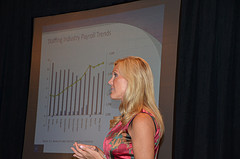There are five prime motivators that drive every candidate. Appeal to them and you’ll close your prospect nearly every time.
Those motivators, and how to make them work for you, was the theme of Greg Doersching’s presentation to the recruiters gathered here in Dallas for the annual Fordyce Forum. A recruiter and trainer, managing partner and founder of The Griffin Search Group, Doersching provided his audience loads of down-to-earth advice on what he said is his version of sourcing — getting a candidate to say yes — and mean it — to a job opportunity.
Most recruiters open their initial conversation with a prospect by pre-qualifying them, instead of attracting them. That’s a mistake, said Doersching, trying to “jam” together the qualifying phase with the attraction. Even when they give you a yes, unless you’ve hit enough of the five motivators, you may never hear from them again. So “give them the details; hit those motivators,” he said.

Those motivators? According to Doersching they are:
- Quality of life
- The responsibilities and challenges of the job;
- Whether it is a step forward in career;
- Geography, as in ‘is it closer to home, whatever home may be to them,” and;
- Money.
Like Doersching’s workshop — “Ready, Aim … Dial. Strategic Sourcing for Recruiters” — this year’s Fordyce Forum is heavy on the practical. So heavy and so focused on how-to that Forum chair Barbara Bruno quipped about only trying to implement three of the ideas. “Don’t try everything at once,” she laughed, opening the conference with the upbeat, motivational comments so familiar to anyone who has ever heard her speak.

The economic news in the world may be iffy, even gloomy, but employers are hiring, job orders are coming in, and recruiters are making money. The conference, she said, is a perfect opportunity to network with other recruiters and agency owners, exchange ideas, and get recharged. This, said Bruno, is “a very exciting time in our profession.”
As if to underscore those comments, keynoter Joanie Ruge, SVP and chief employment analyst for Randstad US, pointed out that the unemployment rate for college graduates is about half the national 8.2 percent rate, making recruiting experienced, educated workers more difficult than hiring managers may suspect. And in certain industries — IT, engineering, and healthcare — the challenge is getting tougher every day.
With the increasing interest by business on temp and contract hiring, particularly in the professional ranks, there’s “a tremendous amount of opportunity,” Ruge said. That’s all the more reason, he told her rapt audience, to “build your brand. You can be the expert your clients and candidates look to.”
Peppering her talk with charts and graphs to illustrate opportunities, Ruge pointed out that developing a personal brand is not rocket science. “You,” she said, “can talk about what’s happening in the job market.” It’s not hard to find data about the labor market in specific areas and industries. Listing some of the better known sources, such as the Bureau of Labor Statistics, Staffing Industry Analysts, even Monster, Ruge said, “You can put this in front of your candidates and clients to show them what is happening… The news that’s more than just the headlines.”
She offered four, broad tips:
- Content is king – “Get a good biography,” Ruge advised. Start with LinkedIn, but make sure to demonstrate your expertise by posting your own analysis of the market, useful articles, and speak as an expert at local events,
- Get a www.ME.com command center — Get a URL in your name. Post your bio there. Offer articles, commentaries, and other useful information that will further your expert brand.
- Keep up relationships — Build your network and speak with your contacts. Share your successes, offer advice and ask for it. “Word of mouth still rules,” Ruge says.
- Get social — Get on the key social media sites. Connect all your social network sites and services there, especially LinkedIn, Facebook, and Twitter. It’s not critical to post something every day or something different to every site, but don’t think posting jobs is enough. Says Ruge, “Remember that content is king.”
